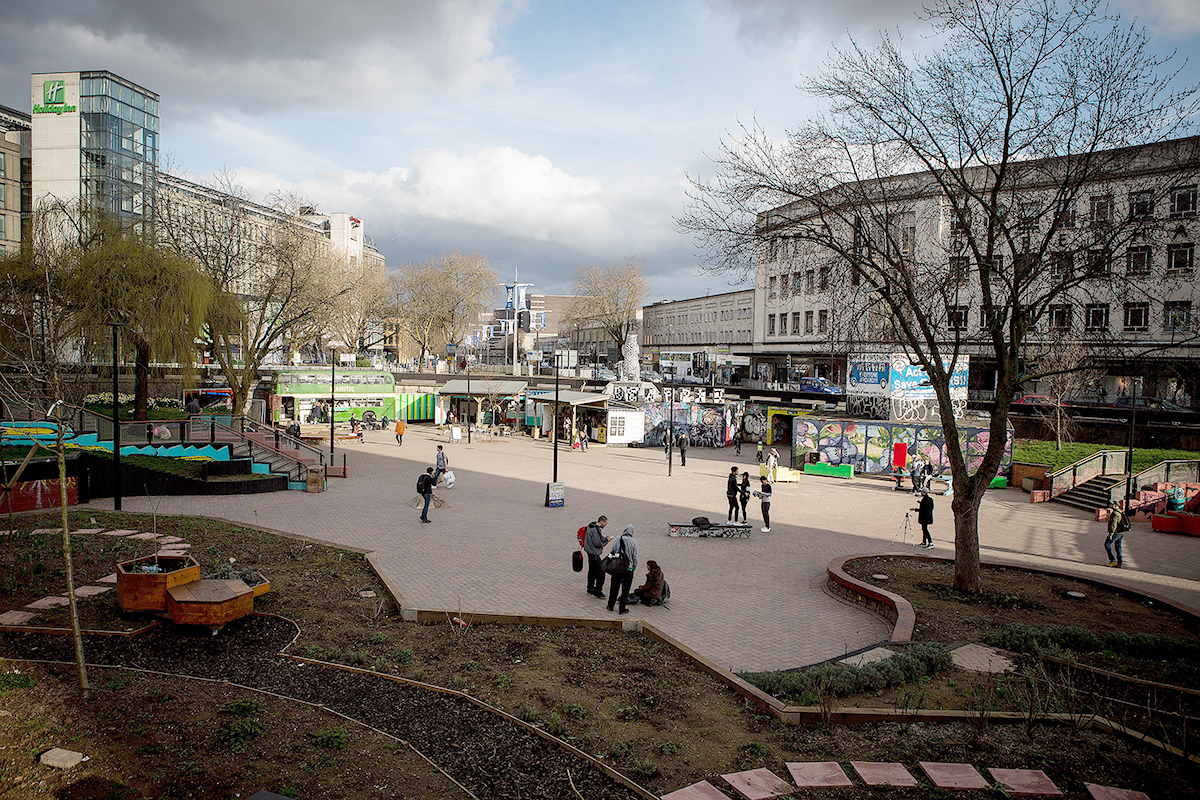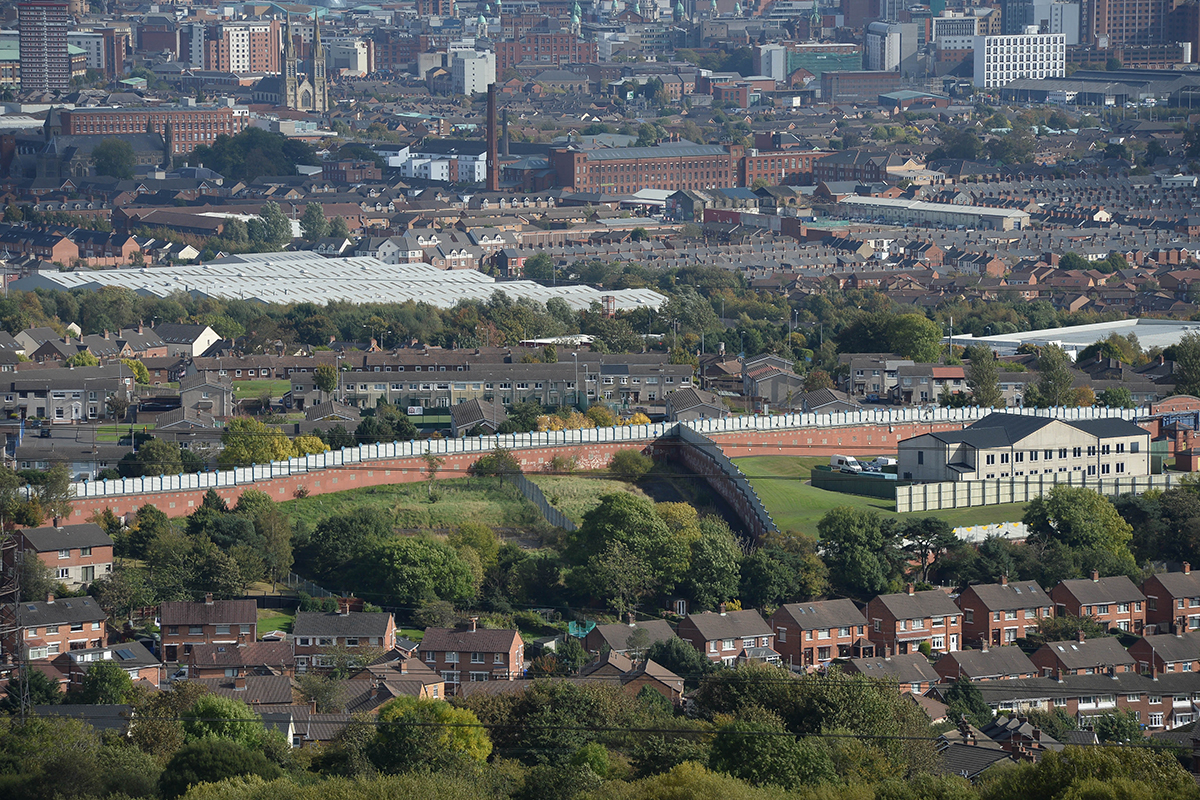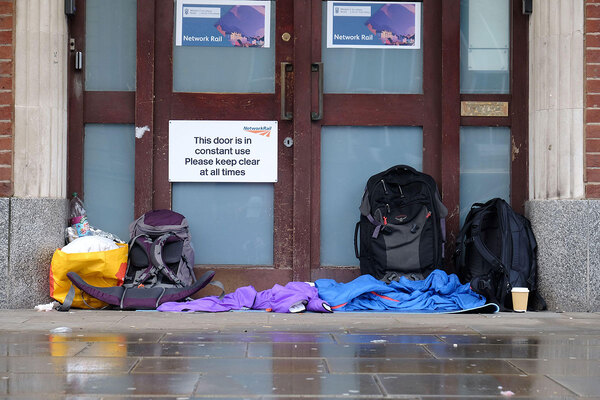You are viewing 1 of your 1 free articles
Direct action on homelessness in Bristol
Levels of homelessness in Bristol are on the rise, which has sparked a community response on the ground. Jessica Bateman looks at the problems of such uncoordinated activities. Photography by SWNS
It’s Sunday evening at Bristol’s famous ‘Bearpit’ – an underpass just north of the city centre. Decorated with colourful street art and home to several skateboarding ramps, the spot has long been a meeting point for many of the city’s groups and subcultures, including its rough sleepers. Tonight, around 10 volunteers are here to hand out bottles of water, sandwiches, clean clothes and sleeping bags to those sheltering in the space.
“How’s it going, Mark?” one woman asks a man shivering in a too-big parka coat. “Not good,” he replies. “I don’t understand why they can’t open up some church halls for us.”
Inside Housing is visiting Bristol to learn about the local community’s on-the-ground response to the city’s homelessness crisis. Hereon th rough sleeping has increased 14% during the past year alone.
Bristol City Council and mayor Marvin Rees pledged to make ending homelessness a priority back in winter 2016. But the growing numbers gathering in the Bearpit, an increase in sleeping bags in shop doorways and a rise in begging are leading local residents to tackle the issue themselves. Groups that help to collect and distribute food, clothes and sleeping bags have thousands of followers on social media, and a recent ‘day of action’ saw hundreds of people gather in the city centre to hand out goods and provide services such as haircuts and dog grooming.
One of those people is 52-year-old Chris, who is in the Bearpit today with a group of friends from Pill, a village on the edge of Bristol. “It started at the end of November 2016,” says Chris, who doesn’t want to give his surname. “Me and some friends met some guys at a protest who had opened a squat for homeless people in London, and they really inspired us. We took a look around Bristol, saw how bad things were, and decided we’d try and do something.”
Chris and a few others started venturing into the city centre at weekends with food and bottled water. “It all just took off from there,” he explains. “There’s a cracking community spirit where we live. More people started joining in, then the local pub said they’d take donations. We now go out twice a week every week.
“From what we see, the charities don’t do enough. I’ve heard people say no one goes hungry in Bristol, but we manage to give away 30 meals in half an hour.”
“People mean well, but they don’t have any real knowledge.” - Jasper Thompson, Help Bristol’s Homeless
Chris’ group is not the first, or only, one of its kind. Multiple projects like this, usually started by friends using social media, have sprung up in the past few years. Working out how to harness the enthusiasm in a constructive way is causing some challenges.
“The first [project of this kind] I came across was called Keep Bristol Warm,” says Richard Drake, co-chair of Bristol Homeless Forum, which promotes co-operation between organisations working in the field. “It was just one guy who wanted to do something so he started handing out sleeping bags and clothes, then he realised he couldn’t deal with it all himself, so he approached the existing organisations.
“It’s great that the enthusiasm is there, but people don’t necessarily know what to do. They see rough sleepers and assume nothing’s being done, even though a lot is being done… It could be so much more useful if they worked alongside what is already happening.”
Mr Drake says groups such as local businesses or schools often get in touch to ask where they should hand out food. “I try to tell people there’s already a lot of food being given out, and that they should perhaps contact existing organisations to ask where the gaps are that need to be filled and what would be of most use,” he says.
One local man whose have-a-go generosity has evolved into a formal enterprise is Jasper Thompson, founder of Help Bristol’s Homeless. He made national news after converting shipping containers and buses into temporary housing. Having started by handing out donations in the city centre in his spare time, he’s now registered as a community interest company and is working with Bristol City Council to get his accommodation project off the ground.
“I wanted to do something more long term, to help people get off the streets,” he explains.
Mr Thompson had already sourced a disused shipping container and was converting it into a live-in unit when he contacted the council about obtaining planning permission. Although some agencies were sceptical, he worked with Paul Smith, cabinet member for housing at Bristol City Council, to secure a plot of land and will begin housing people this year – evidence that it’s important for established organisations not to dismiss members of the public who are taking it upon themselves to help out.
Now armed with a better understanding of the issues, Mr Thompson is aware of the downfalls of DIY charitable work, warning: “People mean well, but they don’t have any real knowledge – they don’t know numbers or co-ordinate with the police or hospitals.” He even believes some could be putting rough sleepers and volunteers in danger.
“One thing I’ve learned is that you need public liability insurance in case someone gets hurt,” he says. “Some of the groups have no regulations on how food is prepared or kept. They leave it sitting out overnight, or leave it in the Bearpit, which creates a hygiene problem. Sometimes it’s like a trophy for them – they go and take selfies with the homeless people.”
Mr Thompson is making contact with each group working in the space to understand what everyone is doing, and is planning an event to get them all communicating efficiently.
However, Chris isn’t completely convinced. “I’m happy to liaise so we don’t all go out at the same time,” he says. “But Jasper’s a for-profit company, he works in a different way. We do this for nothing, no one’s getting paid – that’s why we get so much support.”
The organisation is a CIC, which means its profits and assets must be used for the benefit of the community.
Community efforts
Manchester
Greater Manchester saw a 41% increase in rough sleeping in 2016. Activists responded by opening a series of squats in the city to house people. Mayor Andy Burnham recently pledged to eradicate homelessness by 2020.
Leeds
The Homeless Leeds Support Group was set up by volunteers using social media, and now works alongside shelters and outreach projects to help people into temporary housing. It publishes an Amazon wish list to inform the public of the products most needed.
When pressed on where his distrust of local services comes from, Chris says he did initially attend a charity-run volunteer day but “left feeling totally disappointed”.
“Hundreds of people turned up, but it seemed the homeless community didn’t even know about it,” he explains. “The charities seemed to just sweep up all the donations and leave. We felt the homeless community was really let down.”
However, the council’s Mr Smith insists the ambitious plans to cut rough sleeper numbers are on track. “Not everything has come to fruition, but they should be making a difference next year,” he says. “In 2019, we expect the number of rough sleepers to be down to single figures.”
According to the councillor, 16 churches in central Bristol will be providing beds, dinner and breakfast from late March; 90 acquired properties will be converted into temporary housing; commercial guardianship properties will transition to the control of charity St Mungo’s, and 12 permanent flats for homeless people with challenging behaviours will be built.
One of the problems in Bristol is communication between agencies and the public, both about what is being done and where help is most needed. In response Mr Drake and Mr Smith have launched a website, bristolhomelessconnect.com, which has resources both for rough sleepers and those who want to help. Bristol Homelessness Awareness Week, which takes place at the end of March, has similar aims.
“People in Bristol are incredibly generous,” says Mr Drake. “I think the council are trying ever so hard under enormous constraints. This is a nice place to live, people want to move here, and so property prices and rents are rising.
“Even just 18 months ago, I would’ve said the main causes of homelessness were relationship breakdowns and mental health issues. Now it’s simply evictions from private rentals because they can’t afford the rent increases. In shelters, we’ve seen a massive increase in the number of people who are in work.”
Mr Smith agrees. “Sometimes it feels like trying to save a flooding ship with a ladle – the impact of government welfare reforms is so enormous,” he says. “Housing benefit for under-35s is now £67 a week. I don’t know anywhere here you can rent for that amount.”
And, although difficult to quantify, it is believed that homeless people from other towns may relocate to the city to access its good services and compassionate spirit. “Bristol people are, on the whole, very generous and friendly – you won’t go without food or clothing here,” adds Mr Thompson. “When we do outreach, we see new faces on the street week in, week out, because they have heard it’s a good place to live.”
Update: at 10.25am 13.2.18
The article has been amended slightly to make it more clear that Help Bristol’s Homeless is a non-profit Community Interest Company
Related stories










